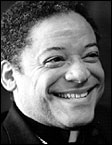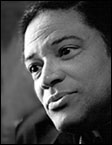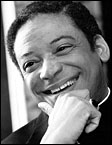Bishop Perry encourages black vocations, talks mergers
Ring! Ring! It’s 6:30 a.m., Central Standard Time, and the rectory
phone at All Saints Parish in Milwaukee demands to be answered.
The call is clear. Its pastor is to come back to sweet home Chicago
to serve
the Catholic Church in the place his faith was born.
The pastor, Joseph N. Perry, left this archdiocese as a seminary
student but returned as a bishop.
“I remember not being able to stand up,” said Chicago’s 28th auxiliary
bishop, upon hearing the news to pack his bags.
“Never in my wildest dreams did I think I would be coming back
here. It was a total surprise,” said Bishop Perry. “And a total
disruption of what I was doing at the time. We had just planned
a capital campaign at the parish with a lot of fliers printed
with my signature that we weren’t able to use.”
Listening to the bishop mention the disruption caused by his elevation
is to get a peek into the importance of order, discipline and
rewards he believes comes from proper planning.
Talking to the episcopal vicar of Vicariate VI, home to many black
Catholics, just before the start of a historic gathering of Chicago’s
black Catholic community, one is sure of one thing: there have
been meetings upon meetings. Little has been left to chance. The
stakes are just too high.
Bishop Perry understands that the proposals fostered by this two-day
event, Nov. 3-4, will likely impact the future of black Catholics
in the archdiocese for decades to come.
Catholic New World: Did you really know at age 9 that you wanted
to become a priest?
Bishop Joseph N. Perry: Yes. That was when I first mentioned it to my mother. My father
was a bit more probing with his questions. My mother was a little
more hesitant, probably because I was the oldest child of six
[three girls, three boys] and there would be no possibility for
grandchildren.
I came from a family where my folks didn’t have advanced education,
so I was the first to really imagine and envision going off to
pursue a dream of such magnitude. So my mother struggled with
it a bit more than my father, but they were both accepting and
encouraging. I am lucky to have them both still with me.
CNW: Looking at parents and grandparents you’ve encountered in
the black Catholic community today, do you find similar levels
of encouragement?
Also, within the archdiocese, is there a nurturing structure in
place where a black male who is considering the priesthood can
have that desire met with encouragement?
BJP: From my perspective, the support and presence of encouraging people
are not there as they once were. I had my parents. I have a relative
who is a cloistered nun. I had the nurturing Catholic schools
with nuns who prodded you on. A lot of black young men and women
don’t have those things today. Either they are lacking an intact
family or they are not attending Catholic school or there might
be several religious traditions in one household.
We are finding more and more the people who respond to that sense
of call today they are pursuing that almost singly as individuals
and the supports are not there. That means people within the church—parish
priests, pastoral ministers—have to be a bit more serving and
loyal to young people by giving them supports they otherwise would
not have.
There is a young man at St. Sabina who is entering the Redemptorist
order. He stopped me after a talk one afternoon on the West Side
and just knocked me off my feet telling me his story. He said
he had been running into barriers beginning with his mother and
grandmother. So I invited him into my office and we talked about
how he could withstand all of that and pursue a call despite all
of the negatives.
That is unusual. If a kid goes off to college to become a lawyer
or an engineer … [he laughs] there are people rooting him on.
But when it comes to the priesthood and religious life, I guess
the image isn’t as impressive as it once was. The idea is somebody
else’s child, but not my own.
CNW: I’m glad you mentioned this story since I’m familiar with
it. The young man’s pastor told me that he wanted to find a place
for him where he could pursue his call outside of the archdiocese
because the pastor felt the archdiocesan seminary system could
not possibly nurture an African-American.
BJP: We need more work in this area. It has been kind of hit-or-miss.
We have only one African American theological student at Mundelein
[Seminary]. He is from Holy Angels. We have no one in the college
section. At [Archbishop] Quigley there are a number of students
of African descent, but many may or may not have been born here.
That is a different experience.
We need more inroads into the African-American community to reach
both men and women. We have a large number of African-American
Catholics here. You would expect vocation numbers to be much larger.
CNW: Why have vocations been so much more difficult here in Chicago?
BJP: It all depends on initiatives. Washington [D.C.] made a concerted
effort to seek out African-American members. Given the diversity
of the southeast area, they wanted to overcome their image as
an exclusive institution. It all depends on local initiative.
You can overturn things if people have the courage to do so.
CNW: Why did you leave the Chicago Archdiocese to pursue your
vocation call?
BJP: That had to do with vocation recruiters. In the 1950s, many religious
orders were coming into Chicago, especially those who worked among
African Americans in ministry, came to South Side parishes. Quigley
at the time didn’t have a strident recruiting program in South
Side parishes. There was a huge waiting list at the time to get
into Quigley. It was seen at the time as something like a West
Point, where you got in by recommendation.
What I remember well is that one afternoon a Capuchin brother—a
black Capuchin brother—appeared at my back door unannounced. His
family was from Chicago. He took me to a final vows ceremony for
someone entering their order. The next thing I knew I was writing
out the papers to enter the seminary, just north of Milwaukee.
I didn’t know that much about Quigley because Quigley didn’t make
that much of an impression on me.
CNW: Is it true that in Milwaukee you were responsible for pulling
a parish “out of the red” financially and into the black?
BJP: Actually, All Saints had just completed a merger of six parishes.
The central city parishes [in Milwaukee] went through a school
merger with two campus sites. One ended up being predominantly
Hispanic, the other mostly African-American. It was a merger of
11 grade schools. The parish component was the second part of
the merger restructuring.
It was a three-year process to foster familiarity leading up to
ever linked and conjoined activities and mergers of parish councils,
finance councils, the merging of assets and finally finding a
new name. There were nine parishes altogether. My parish, All
Saints, combined six of them. The other, St. Martin de Porres,
was made of three parishes.
I was assigned at the tail end of that process and somehow got
the people settled into the experience of being a unified parish.
I was only there three years.
CNW: How do you go about something like that? How would one go
about that in Chicago when some here are still unsettled about
the merger of St. Monica into St. Elizabeth that took place 75
years ago?
BJP: We thought it would be impossible too. But it was a slow process.
It didn’t come from an edict from on high. They tried in Milwaukee
to get the people to become a part of it—to own it as much as
possible—realizing that you can’t please everyone. That’s why
it took over three years to accomplish. Slowly people began to
see the positives of creating a larger family, a larger parish
family.
Then [the parishes] dropped their names, which was very, very
courageous for people to do. It is like asking someone to drop
their last name and take another name. Then the archbishop decreed
it a new entity. Then came the fight over where we would worship
as a new church.
In my limited experience in this area, I think this is a positive
model in comparison to other models of closures and mergers that
were imposed upon people. If mergers have to happen, then this
is the best way to do them.
CNW: What are your thoughts of what will come forth from the Black
Catholic Convocation?
BJP: I would say two things. First, given the historic uniqueness of
coming together African-American Catholics like this, I hope it
really rallies black Catholics to a sense of deep love for their
faith and an appreciation for one another. For black Catholics
to see the stretch of black participation in Catholicism is unique
because it is not something they might see in the parish, since
parishes tend to be rather small.
And second, I would hope we could come to a consensus over issues
relative to our structure in the black community, especially around
parishes and schools, and how we might enliven that inwardly through
evangelization, tithing and vocations, as well as externally.
Top









